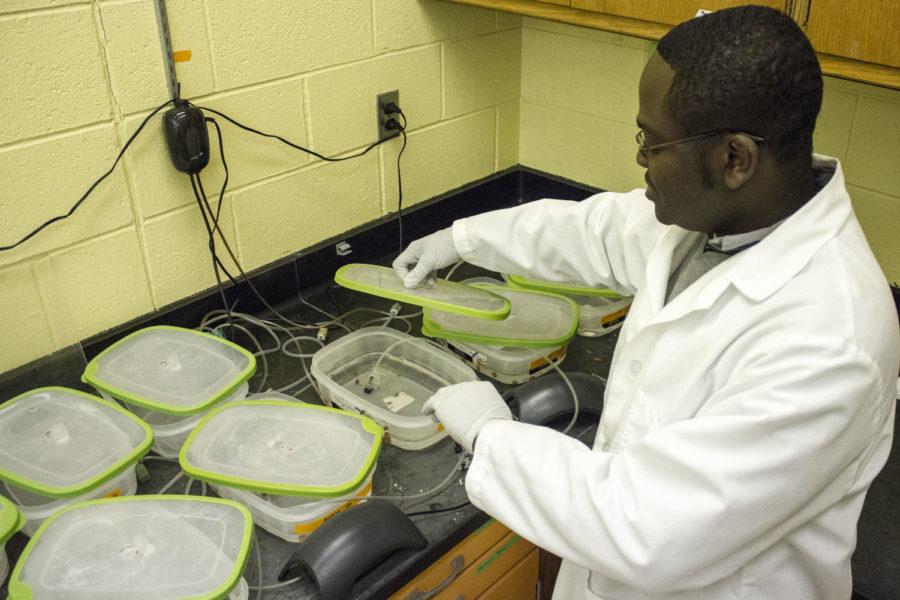ISU research on parasitic worms
Dr. Prince Agbednu, one of the main researchers on work of fighting Schistosomiasis — an infection from parasitic worms, is tending to the snails infected by the parasites. Agbednu’s jobs include tending to the specimen, ensuring they’re fed, and controlling the temperature of the room.
December 5, 2013
The department of biomedical sciences has been researching the development of a specific parasitic worm and is working to develop new ways to create drugs to fight the worms.
The microscopic parasitic worms are called Schistosomes. These are flatworms that infect hundreds of thousands of people around the world in developing countries in Sub-Saharan Africa, South America and Southeast Asia.
The parasitic worms inflict the disease called Schistosomiasis, a chronic illness that causes organ damage and impaired development in children.
Timothy Day, professor of biomedical sciences, said the worms themselves are not the core of the problem. The eggs of the male and female worms are what cause illnesses inside the infected human, once the worms have entered through the skin and have infected the blood stream.
The worms can reside inside an infected human for decades and are constantly producing eggs that are then a parasite to the host. Most children with Schistosomiasis will have a liver that is infected and is 7 to 10 times larger than the normal-sized liver in a healthy child.
One way the team is going about this research on the parasite, is by looking at the worm’s genome to find vulnerability that can be targeted. A one-dose medication is a practical way to reach thousands of infected humans around the world to stop the disease.
“There is much less funding and much fewer resources devoted to the problem than in other fields relative to the scale of the actual problem, I feel like there is a higher potential for impact,” said Mostafa Zamanian, postdoctoral research associate, about why he has chosen to research methods to fight the parasite.
Day, who began researching the Schistosome worms at Michigan State in 1988, said that Schistosomiasis falls under the group of diseases the World Health Organization has tagged as being neglected diseases. Falling under the neglected category is a way to show how little research is being done to find ways to fight the parasite.
About 260 million people around the world are infected with the parasite. In terms of amount of disability caused by the parasite in humans, Schistosomiasis is second in the world to Malaria Day said.
“Thousands of eggs are released on a daily basis and the eggs are lodged in different tissues and cause tissue damage,” Zamanian said.
There is only one drug currently available to fight the disease, but the parasites show signs of resistance against the drug. Currently there are no vaccines for the disease, Day said, and that A stop to the production of eggs means a stop to the disease.
Day, Zamanian and Michael Kimber, associate professor of biomedical sciences, along with the research team, have been conducting research on the parasitic disease since 2000 at Iowa State.
The team’s research has received a Grand Challenges Explorations Grant from the Bill and Melinda Gates Foundation. The research collaboration includes McGill University in Montreal and Queen’s University Belfast.







